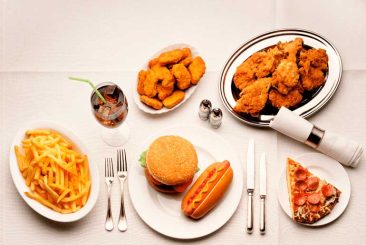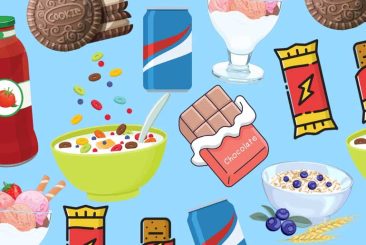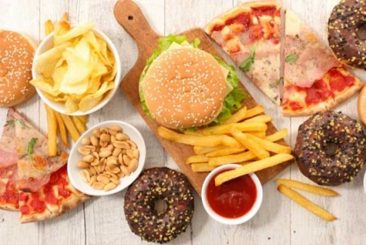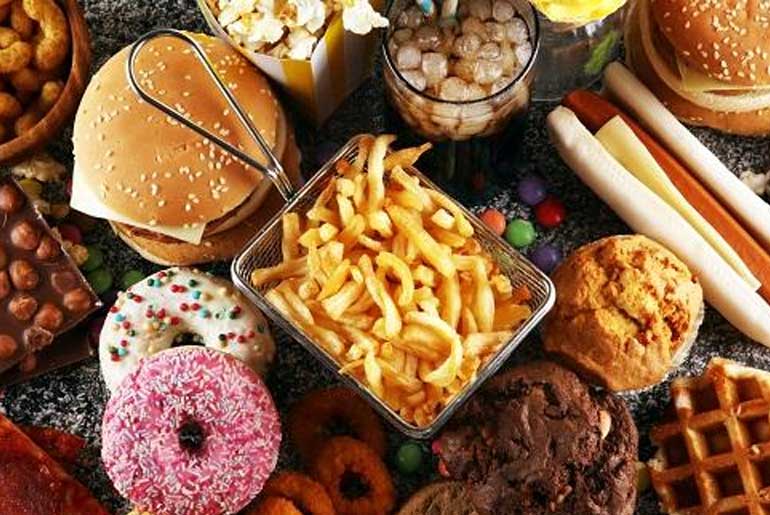Consuming unhealthy foods has been strongly linked to an increased risk of cardiovascular disease. A poor diet that is high in saturated and trans fats, cholesterol, sodium, and added sugars, while being low in fruits, vegetables, whole grains, and healthy fats, can contribute to the development of cardiovascular problems.
Here are some specific ways in which unhealthy foods can impact cardiovascular health:
- Unhealthy foods high in unhealthy fats: Foods high in saturated and trans fats, such as fast food, fried food, processed snacks, and fatty meats, can raise levels of LDL (bad) cholesterol in the blood. High LDL cholesterol is a major risk factor for heart disease and can lead to the formation of plaque in the arteries, restricting blood flow and increasing the likelihood of heart attacks and strokes.

Unhealthy foods that are high in unhealthy fats include:
- Fried Foods: Deep-fried foods like French fries, fried chicken, and onion rings are typically cooked in unhealthy fats that are high in trans fats or saturated fats. These fats can contribute to heart disease and other health issues when consumed in excess.
- Processed Meats: Processed meats such as hot dogs, sausages, bacon, and deli meats often contain high levels of unhealthy fats, particularly saturated fats. These fats can raise cholesterol levels and increase the risk of heart disease.
- Fast Food Burgers: Fast food burgers are often made with fatty cuts of meat and cooked in unhealthy fats. They can be high in saturated fats and trans fats, which are detrimental to cardiovascular health.
- Full-Fat Dairy Products: Full-fat dairy products like whole milk, cheese, butter, and cream are high in saturated fats. While moderate consumption of these foods can be part of a balanced diet, excessive intake can contribute to high cholesterol levels and other health problems.
- Packaged Snacks and Baked Goods: Packaged snacks like chips, crackers, cookies, and pastries often contain unhealthy fats. They may be made with partially hydrogenated oils, which are a source of harmful trans fats.
- Margarine and Vegetable Shortening: Margarine and vegetable shortening are often used as substitutes for butter. However, many of these products contain trans fats, which can raise bad cholesterol levels and increase the risk of heart disease.
- High-Fat Desserts: Rich desserts like cakes, pastries, ice cream, and creamy desserts are typically high in unhealthy fats. They can be made with butter, heavy cream, and other high-fat ingredients that contribute to their rich texture and taste.
- Processed and Pre-Packaged Foods: Many processed and pre-packaged foods, including frozen meals, ready-to-eat meals, and snack foods, contain unhealthy fats. These fats are often used for flavor and preservation purposes, but they can be detrimental to overall health when consumed in excess.
It’s important to be mindful of your fat intake and focus on consuming healthy fats in moderation, such as those found in nuts, seeds, avocados, and fatty fish like salmon. Balancing your diet with a variety of nutrient-rich foods is essential for overall health and well-being.
- Unhealthy foods high in sodium: Consuming excessive amounts of sodium, often found in processed and packaged foods, can contribute to high blood pressure, another significant risk factor for heart disease. Elevated blood pressure can strain the heart and blood vessels, increasing the risk of heart attacks, heart failure, and stroke.

Unhealthy foods that are typically high in sodium include:
- Processed Meats: Foods like bacon, sausage, hot dogs, and deli meats are often high in sodium. They are commonly processed and preserved with salt to enhance flavor and extend shelf life.
- Canned Soups and Broths: Many canned soups and broths, including chicken noodle soup, tomato soup, and vegetable broth, contain high levels of sodium. These products are often used as convenient meal options but can be loaded with salt.
- Fast Food: Most fast food items, such as burgers, fries, and pizza, tend to be high in sodium. Fast food chains often use salt generously in their recipes to enhance taste and preserve the food.
- Packaged Snacks: Chips, pretzels, crackers, and other packaged snacks are often high in sodium. These snacks are frequently seasoned with salt or other sodium-rich flavorings.
- Frozen Meals: Many frozen dinners, such as frozen pizzas, frozen pasta dishes, and TV dinners, contain high levels of sodium. These meals are designed for quick and easy preparation but often have high sodium content for taste and preservation purposes.
- Condiments and Sauces: Condiments like ketchup, barbecue sauce, soy sauce, and salad dressings can be significant sources of sodium. These products are often used to add flavor to meals but can contribute to high sodium intake.
- Pickled Foods: Pickles, olives, and other pickled vegetables are typically high in sodium. The pickling process involves soaking the vegetables in a brine solution, which is often saltwater.
- Processed Cheese: Processed cheese products, such as cheese spreads, cheese slices, and cheese dips, are often high in sodium. These products go through various processing steps that may involve adding salt as a preservative and flavor enhancer.
It’s important to note that while these foods can be high in sodium, moderation is key. It’s recommended to consume them sparingly as part of an overall balanced diet. Reading nutrition labels and choosing low-sodium alternatives whenever possible can also help reduce sodium intake.
- Unhealthy foods high in added sugars: Foods and beverages with high sugar content, such as sugary drinks, desserts, candies, and sweetened cereals, can lead to weight gain and obesity, which are associated with an increased risk of heart disease. Additionally, a diet high in added sugars can raise triglyceride levels and lower HDL (good) cholesterol, further contributing to cardiovascular problems.

Unhealthy foods that are typically high in added sugars include:
- Sugary Drinks: Soft drinks, sodas, fruit juices, energy drinks, sweetened teas, and sports drinks often contain high amounts of added sugars. These beverages can contribute to excessive sugar consumption and are associated with various health issues.
- Candy and Sweets: Candies, chocolates, caramels, gummies, and other sweet treats are generally high in added sugars. These products are often made primarily of sugar and offer little nutritional value.
- Baked Goods: Pastries, cakes, cookies, muffins, doughnuts, and other baked goods often contain significant amounts of added sugars. These treats are typically made with refined flours and sweetened with sugar, making them high in both sugar and calories.
- Breakfast Cereals: Many breakfast cereals marketed towards children and adults are loaded with added sugars. These cereals, including sweetened flakes, puffed rice, and granola, can contribute to a high sugar intake, even if they claim to be “healthy” or “low fat.”
- Ice Cream and Frozen Desserts: Ice cream, gelato, frozen yogurt, and other frozen desserts tend to be high in added sugars. These treats often contain not only sugar but also fats and other additives that can contribute to an unhealthy diet.
- Flavored Yogurts: Flavored yogurts, especially those marketed as low-fat or fat-free, often have added sugars to enhance taste. Checking nutrition labels and opting for plain or unsweetened yogurt with added fresh fruits is a healthier choice.
- Sauces and Condiments: Many sauces and condiments, such as ketchup, barbecue sauce, sweet chili sauce, and salad dressings, contain added sugars. These products are often used to add flavor to meals but can contribute to a high sugar intake if consumed in large quantities.
- Sweetened Breakfast Foods: Instant oatmeal, flavored pancakes, syrup, and breakfast bars are often high in added sugars. These products may seem like quick and convenient options, but they can be packed with sugar and lack essential nutrients.
When it comes to added sugars, it’s crucial to read nutrition labels and be mindful of hidden sources of sugar in processed foods. Opting for whole, unprocessed foods and preparing meals at home using natural sweeteners like fruits can help reduce added sugar intake.
- Unhealthy foods low in essential nutrients: A diet lacking in fruits, vegetables, whole grains, and healthy fats deprives the body of important nutrients, including dietary fiber, antioxidants, vitamins, and minerals. These nutrients play crucial roles in maintaining cardiovascular health, such as reducing inflammation, supporting healthy blood vessels, and managing cholesterol levels.

Unhealthy foods that are low in essential nutrients include:
- Fast Food Burgers and Fries: Fast food burgers and fries are often high in unhealthy fats, refined carbohydrates, and sodium while being low in essential nutrients like vitamins, minerals, and fiber.
- Soda and Sugary Beverages: Sugary drinks like soda, energy drinks, and sweetened juices provide little to no nutritional value. They are typically high in added sugars and can contribute to weight gain and other health issues.
- Processed Snacks: Packaged snacks like chips, crackers, and cookies are often high in unhealthy fats, refined grains, and added sugars. They offer little in terms of essential nutrients and can contribute to a poor diet.
- Candy and Sweets: Candies, chocolates, and other sweet treats are high in added sugars and provide little nutritional value. They can lead to empty calories and nutrient deficiencies when consumed excessively.
- Deep-Fried Foods: Deep-fried foods like fried chicken, French fries, and onion rings are often high in unhealthy fats and calories. They lack essential nutrients and can contribute to weight gain and other health problems.
- Processed Meats: Processed meats like hot dogs, sausages, and deli meats are often high in sodium and unhealthy fats. They offer minimal essential nutrients and are associated with an increased risk of certain health conditions.
- White Bread and Refined Grains: White bread, white rice, and other refined grains have had their nutritious parts, such as the bran and germ, removed during processing. They lack essential nutrients like fiber, vitamins, and minerals.
- Sugary Breakfast Cereals: Many breakfast cereals marketed towards children are high in added sugars and low in essential nutrients. They often lack fiber and contain artificial colors and flavors.
While these foods may be enjoyable as occasional treats, relying on them as a significant part of your diet can lead to nutrient deficiencies. It’s important to prioritize whole, unprocessed foods like fruits, vegetables, lean proteins, whole grains, and healthy fats to ensure you’re getting the essential nutrients your body needs for optimal health.
It’s important to note that a balanced diet, rich in fruits, vegetables, whole grains, lean proteins, and healthy fats, can help reduce the risk of cardiovascular disease. Making healthier food choices and adopting a well-rounded eating pattern, along with regular physical activity and other lifestyle changes, can significantly contribute to maintaining a healthy heart.
Disclaimer:
The information contained in this article is for educational and informational purposes only and is not intended as a health advice. We would ask you to consult a qualified professional or medical expert to gain additional knowledge before you choose to consume any product or perform any exercise.









